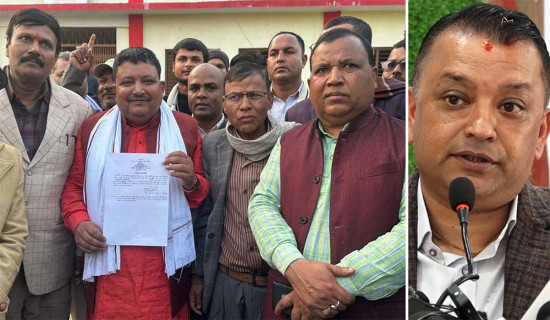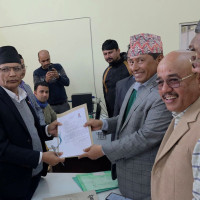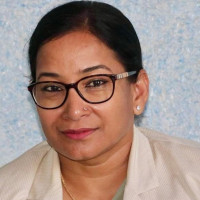- Wednesday, 21 January 2026
Mahendra Ratna Multiple Campus: Academic Assets Of Ilam
Mahendra Ratna Multiple Campus (MRMC), established in the same year (2016 B.S.) as Tribhuvan University, is a TU constituent campus located in Ilam, a district in the far east of Nepal. Established more than five decades ago, this campus has accomplished many significant educational and academic programmes to date. The campus has found new impetus after it was approved as a constituent autonomous campus by TU in 2066 BS (1 February 2010). The campus has been granted a Quality Assurance and Accreditation (QAA) certificate by the University Grants Commission (UGC) in 2015, and the Ministry of Education, Nepal, has awarded the campus as the best campus of the year 2015. As the first autonomous campus, MRMC has the right to make important decisions independently to improve its academic, financial, infrastructural, and administrative activities. This historical achievement has made the faculty, staff, and students optimistic about the prospects of the institution and its stakeholders.

Inaugurated in July 1960 as Mahendra Ratna Mahavidyalaya with an enrollment of only 26 students, this campus started offering classes under the Founder Principal. Khagendra Nath Sharma. At that time, it only offered the course in Intermediate of Arts (I.A.), and since 2029, B.S., it has started offering courses at both the certificate level and the bachelor level with the approval of TU. Now, it has expanded its academic programmes into different disciplines and levels. This campus has been playing a leading academic role in Ilam district and other neighbouring districts—Jhapa, Panchthar, and Taplejung. MRMC, Ilam believes in translating dreams into reality by producing efficient and employable youths in the job market in this modern competitive age to serve the community. Having its cherished past of academic excellence initiated by energetic professionals dedicated to quality education, MRMC, Ilam, deems that education is the only thing that is worthy of investment for the improvement of the quality of life of people pushing the frontiers of excellence. It believes that education is not the name of any degree or certificate that can be shown to others as proof, but the name of our attitude, actions, language, behaviour, and personality with others in real life. This campus has been running multiple programmes, offering a wide range of subjects to its students. It provides programmes of the Faculty of Humanities and Social Sciences and the Faculty of Education at the bachelor and master’s levels, and the Faculty of Management and Horticulture Management at the bachelor's level. Since 2069, this campus has conducted the B.Sc. programme in Horti-Flori Management (18 semesters) approved by TU with an intake of 30 students in its first academic year.
Overview of campus areas
Ilam Campus is located in Ward No. 7 of Ilam Municipality in a peaceful and serene landscape against the historical tea garden of Nepal established in the 1920s. Students from all parts of Ilam district and neighbouring districts come here to pursue their studies. MRMC, Ilam, has a glorious history of producing graduates in political, economic, social, academic, and civil services. The majority of the students enrolled on campus are from the lower and middle classes. Students are attracted to the campus because of the low and affordable tuition fees and easy access. It now has 70 teaching faculty members and thirty non-teaching staff, including support staff, providing higher education opportunities to more than 2,400 students in various academic programmes. The campus places a high priority on creating an environment that enables teaching and non-teaching staff to do their best work. The faculty members are driven by cross-disciplinary collaboration and a community sense for quality education and quality human resources. The campus has 4 Faculties with M.Phil. degrees and 70 Faculties with master’s degrees.
It has a moderate climatic condition, neither too cool nor too hot, with a panoramic beauty of nature, greenery, and tea gardens around. Thus, Ilam can be a good destination for students willing to pursue higher education. MRMC Bachelor and Degree holders have been working as key figures in government offices, various financial institutions, NGOs, INGOs, and cooperatives, as well as in the private sector.
The campus has the vision of developing itself as a leading higher educational centre of academic excellence in teaching, learning, and research. It has the mission of developing competent and skilled human resources through scientific and applied education, to improve the quality of existing academic programmes and inspire society to support the establishment of deemed universities. Its objectives are to improve the educational status by systematically managing its physical infrastructure, such as faculty-wise classrooms, libraries, labs, and equipment, and to improve the examination results of the students by reforming, extending, and better managing the existing academic programmes. Other objectives are to promote the campus as the centre of academic excellence through competition and timely reformation of the curricula and to develop, extend, and upgrade the internal activities and student welfare programmes.
Academic programmes
Tribhuvan University's main objective is to produce trained and specialised human resources in both basic and applied areas of the humanities and Social Sciences, Education, management, and other new programmes. In Ilam, there are 12 Departments with specialised study areas. These include inter-disciplinary subjects like English, Nepali, Rural Development, Sociology and Anthropology, Geography, Economics, Political Sciences, Culture (NeCHA), Mathematics, History, education, and so on. They also offer research methodology courses. Terms of Reference (ToRs) are distributed to all departments and sections of the campus to carry out their respective roles and responsibilities. The campus has adopted both an annual and semester system for academic programmes. As for new programmes, it has also submitted a proposal and Letter of Intent (LoI) to conduct an MBS programme in the academic year 2080–1981. Similarly, a bachelor’s in social work (BSW) under FoHSS is also in the pipeline to produce generalist social workers in human relations and social problems like domestic violence, conflict, child rights abuse, etc. It has also submitted a proposal and Letter of Intent (LoI) to conduct the BICTE programme under the Education Faculty.
Research and publications
MRMC, Ilam, has established a Research Unit for the academic improvement of the teachers, administrative staff, and students as well. For the conduct of research activities, the campus has formulated the Research Unit Directorate (Anusandhan Ekai Karyasanchalan Nirdesika-2069). At present, the Research Unit is being run as per the second amendment to this Directorate. The Research Unit of MRMC, Ilam, has envisioned carrying out many research activities to address the needs and priority areas of institutional development. For this, research methodology trainings and workshops, mini-research projects, and journal publication activities are conducted every year, incorporating all the faculties of the campus. Since 2075 B.S., the Research Unit has started to annually publish an Interdisciplinary peer-reviewed journal called Research Journal, which includes various research-based articles and papers from the faculties in different departments. Institutional and collaborative research has not been published yet. The research methodology training and workshops for the faculties are being conducted after the submission of the proposals to UGC and other line agencies and their approval. All the faculties benefit from participating in different research-oriented activities and capacity-building programmes. Till now, 120 mini-research projects have been conducted, and seven annual research journals have been published with the financial grants provided by the campus to the Research Unit. By providing mini-research grants to the teaching faculties through the Research Unit of MRMC, the campus encourages and promotes teachers’ publication of their research articles through the annual journal publication of the Research Unit called 'Research Journal'. It is planning to publish peer-reviewed research articles as online access through NepJol starting in 2080 BS.

The campus has adopted both annual and semester systems for its various courses of study, with admission notices undertaken by Tribhuvan University. The academic programmes in the annual system admit relatively more students than the semester system. So, the applicants for the programmes in the annual system are evaluated only based on their academic records. But the applicants for all programmes in the semester system are evaluated based on academic records, written entrance tests, personal interviews, and result notices. After the new intake, students get admitted into the academic programmes; they are given orientation in the classes on the nature, objectives, and contents of the courses as well as the academic programmes. Even at the time of admission, the students are given individual counselling regarding the scope of the course as per their academic record, background, and aptitude for their future career guidance. Usually, remedial classes are conducted in the departments where the students are weak and if they demand them. Such classes are conducted only after the completion of regular classes.
Facilities
The campus comprises the facilities and access of hostels (boys' and girls’), an automated library, communication infrastructure like the internet, CC Cameras, and subject-wise Departments with computer and internet access. Students are provided with extracurricular activities, health care centres, beautification around, boundary wall, scholarship scheme (full or 50 per cent), public support services, peaceful and natural landscape of historical tea garden nearby, extension of classroom buildings and spacious classrooms, transportation service, wider catchment areas, strategic planning, academic calendar and prospectus, encouraging faculties for further studies (M.Phil. and Ph.D.), QAA certification, QAA reaccreditation, quality teaching and learning, research training/workshops and publication, and mini-research projects.
Way forward
MRMC, Ilam, has established its historical academic status and potential at the provincial and national levels. It aims at preparing disciplined, self-reliant, and responsible citizens. It has its land (about 200 ropanis), buildings and blocks, human resources, an automated library, and academic status and recognition. The campus has promulgated its policies and procedures for implementing academic, administrative, financial, and infrastructural activities. The campus has received strong support from both the campus community and the local community, ensuring its continued development and academic growth. Stakeholders have consistently shown their trust in the sustainability of the campus and its academic improvement through their regular participation over the past few decades. There is a high expectation that the campus introduces technical studies, non-credit courses such as tea tourism, Science studies, and CTEVT-based subjects so that the quality students produced by both community and private schools and colleges should not go out to pursue further studies at the bachelor's level. MRMC, Ilam, is an academic asset of the Ilam district. It has been carrying on a six-decade-long glorious and leading academic history in the eastern part of Nepal. It carries great responsibility and expectations for the stakeholders and community. Despite such prospective enhancements, the expectations are still more concerned with the quality of teaching and learning, research work and refresher trainings, transparency in actions and activities, the right to information, result analysis, and admission ratio of the students, the introduction of new subjects, and their market research as per the local need and context. It has committed to working hand in hand for the betterment of the campus and the benefit of all concerned.
(The author is a reader at Tribhuvan University and is currently teaching at MRMC, Ilam.)





-square-thumb.jpg)
-original-thumb.jpg)









